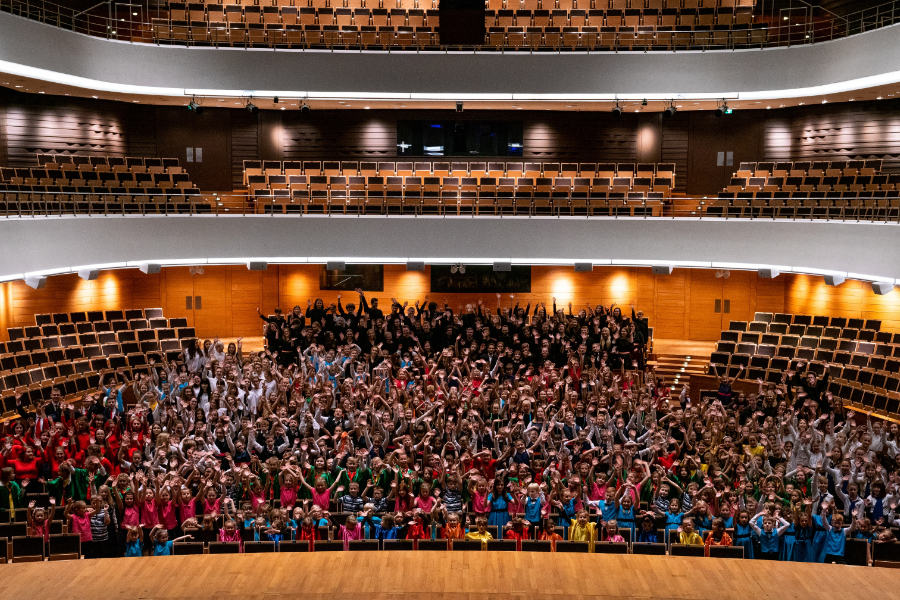There is no other way to celebrate National Independence Day than together, and at NFM we believe that the best way to spend time together is by making music. For this special day, we have invited sixteen Lower Silesian children's and youth choirs participating in the Singing Poland programme, initiated in 2006 by Andrzej Kosendiak. These groups, together with other Wrocław choirs and an instrumental ensemble, will present works by great figures of Polish choral music: Juliusz Łuciuk, Józef Świder and Stanisław Moniuszko, alongside music by artists of the younger generation.
Juliusz Łuciuk and Józef Świder are two artists belonging to the generation of composers born in Poland in the interwar period. After graduation, Łuciuk focused solely on composition. Whereas Świder chose a teaching career and in Silesia he is remembered also as a teacher to Aleksander Lasoń, Julian Gembalski, Andrzej Dziadek and Wiesław Cienciała. The pieces for choir written by both composers achieved great popularity among performers. They have become fixtures in choral programmes throughout Poland, finding their place there alongside the works of Stanisław Moniuszko. During the meeting of the Singing Poland choirs, fragments of his operas: Verbum nobile and The Haunted Manor, but also familiar songs from the Home Songbook will be heard. There will also be world premieres in the programme. We will listen to four new pieces by Krzysztof Domański – a composer and flutist based in Wrocław, who set to music the wonderful texts of Aleksander Fredro, Stanisław Jachowicz and Maria Konopnicka. The texts of the latter were also used by other authors of the premiere works. These are hopeful poems Rainbow and Goodnight. The music for the former was written by Izabela Polakowska-Rybska - artistic director of Singing Poland. The latter inspired Michał Ziółkowski – a composer who is particularly keen on collaborating with choirs, and whose works are often heard at the National Forum of Music.
Almost a hundred years ago, Karol Szymanowski, in his writings on music education, described the choral group as an ideal model of human community and argued that harmony resulting from collaboration in live performance can translate into harmonious social life. We deeply believe that music really has a special power to unite us despite divisions. So let’s sing!

D. Lasota Lipeńka* (folk text)
J. Łuciuk O, ziemio polska (text John Paul II)
J. Świder Moja piosnka (text C.K. Norwid)
N. Blacha Modlitwa o pokój (text M. Hanusiewicz)
J.A. Wichrowski Elegia o chłopcu polskim (text K.K. Baczyński)
K. Domański Pieśń leniwca* (text S. Jachowicz); Bajeczka o osiołku* (text A. Fredro); Bocian* (text M. Konopnicka); Zamiary Stasia* (text M. Konopnicka)
E. Pałłasz Śpiewaj, gdy las się zieleni (text J. Mackiewicz)
W. Lutosławski Wianki (text S. Szuchowa)
M. Ziółkowski Dobranoc* (text M. Konopnicka)
M. Kazimierski Taniec* (text M. Konopnicka)
I. Polakowska-Rybska Tęcza* (text M. Konopnicka)
M. Gałęski Hymn III Tysiąclecia (text M. Gałęski)
*world premiere
Izabela Polakowska-Rybska, Milena Będkowska-Hruby – conductors
Monika Kruk – piano
Aleksandra Gołaj – percussive instruments
Krzysztof Domański – flute
Maria Zawartko – host
Guests:
Wrocław Women's Choir
Men's Vocal Ensemble I Signori
Izabela Polakowska-Rybska – artistic direction of the vocal ensembles
Choirs of the Singing Poland Lower Silesian Region
NFM Audio Player - obsługa komponentu Event
NFM Video Panel - obsługa komponentu Event
Jerzy Wasowski's Songs for Children
